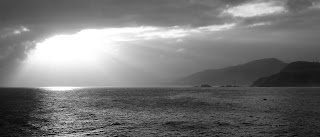The Bay of Biscao: Basque Country.
I have been reading the Codex Calixtinus, or at least a translation of it and commentary on it by William Melczer. The codex was written in the 12th Century and is the first substantial record of the Camino Santiago. It consists of 5 short books which have independent origins but have been combined by an unknown editor/author, who has appended a pseudepigraphic introduction to each in the name of Pope Callixtus II. They are all to do with the development of the cult of St. James in the early middle ages.Book 1 is a collection of liturgical bits and pieces and Book 2 a collection of miracles attributed to the saint. Book 3 records the miraculous transfer of the saint's body from Palestine to Galicia and Book 4 is an account of the military expedition undertaken by Charlemagne and Roland who attempted to drive the Moors from the Iberian Peninsula. Book 5, the one which I am really interested in, is a pilgrim's guide to the Camino: the first one ever written. It is in fact the first tourist guide book ever written.
The Codex is written by a Frenchman, and it is marked by a chauvinism which makes Donald Trump look positively open minded, tolerant and accepting by comparison. Speaking of the Navarrese, for example, he says,
"Navarrese eating and drinking habits are disgusting. The entire family - servant, master, maid, mistress - feed with their hands from one pot in which all the food is mixed together, and swill from one cup, like pigs or dogs. And when they speak, their language sounds so raw, it's like hearing a dog bark...These are an undeveloped people, with different customs and characteristics than other races. They're malicious, dark, hostile-looking types, crooked, perverse, treacherous, corrupt and untrustworthy, obsessed with sex and booze, steeped in violence, wild, savage, condemned and rejected, sour, horrible, and squabbling. They are badness and nastiness personified, utterly lacking in any good qualities. They're as bad as the Getes and the Saracens, and they despise us French. If they could, a Basque or Navarrese would kill a Frenchman for a cent..." And he then goes on to describe their sexual habits in a most...surprising... fashion.
The book lists the best hostels to stay in, and all the must visit shrines. There are warnings about the unsafe rivers and the food and the locals, and an extensive description of the great cathedral of Santiago Compostela. For an ancient text the codex is a lot of fun - laugh our loud quaint at times - and I loved reading of places I have visited and seeing how much, and how little has changed in a millennium. But what was most interesting was tracing the development of the cult of St. James, as the product of a French attempt to extend political influence beyond the Pyrenees. This is very much a French, not a Spanish book. The perspective is French. The saints described are French as are most of the shrines associated with them. The peoples of Navarre, Cantabria, the Basque Country and Galicia are counted as evil or otherwise depending on how closely their culture and customs approximate those of France. As the needs of French influence required it, the pilgrimage and its mythical under girding was invented and developed. It is an object lesson in the development of cult; of religion. So the stories of James and his magical posthumous trip to Galicia are first recorded only in the 9th Century, and the various places associated with his cult were discovered just when the political needs of the time required them to be.
Now all this could be a little disillusioning if the experience of the Camino was somehow tied to the historicity of its associated mythology. But off course the skeleton in its silver box in the crypt of the great Cathedral isn't really that of St. James, but we all knew that already didn't we?
The Camino is a human invention, and knowing how it arose and developed says nothing about the incarnate God who can be experienced and known in the observance of this ancient and very human artifact, the great pilgrim's route. Our God is incarnate, that is, our God takes form in the midst of our lived reality and invites us into relationship. The path of miracles is no less divine for the fact that it wasn't originated by a stone boat without oars or mast carrying a headless corpse miraculously to Spain, but rather was forged by thousands of people over several centuries acting out of a vast range range of human motivations and interests. In fact, it is more divine for being so.

Comments